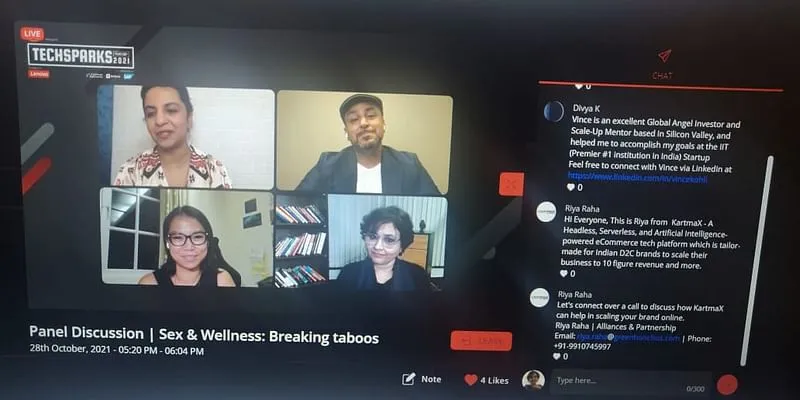2020s will be to sextech what 90s was to internet: Pleasure wellness panel at TechSparks 2021
At the ongoing six-day annual TechSparks, panellists of the sex and wellness session talked about breaking taboos to start up in this sector and how the time for this sector to explode is now.
The rise in the number of sextech startups indicates the pressing need for accurate information and products related to sexual wellness. At TechSparks 2021, Shakun Sethi, Founder of ; Jingjin Liu, Founder of Singapore-based ; and Raj Armani, Co-founder of adult products e-store , talked about the global sexual wellness market, the future of wellbeing, and breaking taboos.
“I think the 2020s is to sextech what the 90s was to the internet. So, if you are not in this industry, you are missing out,” said Raj Armani, rethinking the future of the sector.
“GenZ is very vocal about sexual wellness. Sexual education and pleasure for everyone,” said Jingjin Liu while talking about how she sees the market opportunities in the sector.
“In all the euphoria, let’s not forget that we still have a lot of ground to cover,” said Shakun Sethi on the need for the right sex education.
Excerpts from the conversation:
YourStory: The global sexual wellness market is projected to grow to $122.96 billion by 2026. Yet, sextech startups face many challenges and obstacles. To start with, what specific taboos did you have to break?
Shakun Sethi (SS): The first taboo that I had to face was recruitment. And I am not even talking about what the family will say or my friends being hesitant to retweet or share about my startup on social media, all that’s secondary. The important thing is finding the right people.
And even when you find the right people, they back out due to family/societal pressure. The ones who agree to join, however, do not know what they are talking about.
Especially, when we are trying to build something which is gender agnostic, what is the right pronouns to use, what is the right way, what is the wrong way. Initially, a team makes or breaks you, so we were lucky to hire them fast and let them go faster.
Jingjin Liu (JL): I cannot agree more with Shakun. My co-founder left because of the space and the challenges of being in a space that is so stigmatised and tabooed. But for us at ZaZaZu, which is primarily focused on women, there are many misconceptions like good girls do not like to have sex, pleasure is guilt, all such narratives, especially in the Southeast Asian region where we operate.
We try to break these taboos and bring pleasure into women’s lives. But more often than not, the biggest challenge is the women themselves.
Raj Armani (RA): It’s been eight years since we started and it’s been a progression of challenges that we have seen across. But the centre of all the challenges is the lack of clarity in the law. And that impacts everything.
It impacts imports and consumers’ buying decisions ("Am I doing something illegal if I buy these products?). Basically, we have to have an army of lawyers as retainers.
In the beginning, because of the legal aspects, we could not grow, and we also had the recruitment challenge in the beginning. For at least three years, we had no woman working in our team.

YS: What are the barriers in terms of advertising and marketing your products and services?
SS: Whatever we do, there will be an entry barrier. We do not have time, money, or resources for advertising or marketing, so what is plan B? We are a content play platform, we are selling a journey of the consumer.
Even today, people search on Google for any information on sex or sexual wellness but it may or may not be accurate. Hence, we are building our own platform that provides authentic information that the reader is searching for.
JL: We are building a community of female wellbeing clubs and infusing sexual wellness into other aspects of women’s lives like yoga and mental wellbeing, introducing aspects like ‘glow job’ and ‘sexercise’. We do heavy advertising on social media for wellbeing and self-care.
The trick is to get women through the door, but if you throw the word sex on their face, they will run away.
RA: Our advertising strategy has changed over time partly because of a lack of options and partly because the demand is more than supply. So the purpose of advertising for us is not to go in search of demand but to be found where the demand is.
One of the decisions we made early on was to sign a celebrity to be the face of the brand and that got us a lot of mileage in the media. People are anyway looking for these products. You need to make your brand trustworthy and credible and that comes into play when the potential customers are looking to convert. We pivoted to solely focusing on social media later on.
We have over 500,000 customers who are our best billboard and advocate for our brand.
We transitioned our marketing budgets to work with influencers to have a sex-positive community and to normalise sex and pleasure.
YS: Even when the idea is exceptional, many companies don't receive investments because of the reputational risks. How are you breaking taboos when it comes to raising capital?
SS: We just raised an angel round. Having said that, we are also very conscious of who we take the funding from. You have to gauge what they want and what kind of questions they are asking. I am more sceptical in saying yes to everyone because we know one way or the other we are going to make money.
I think we are at a fabulous time. There are opportunities all around. I feel people are now ready, even from the VC sector. That said, we’ve also had strange questions asked to us.
JL: I feel the fundraising strategy in sextech is different from other sectors. For instance, there are some institutional funds and VC firms in the US like Unorthodox Ventures, as the name suggests, they fund unorthodox ventures, so money per se is not a problem.
The issue is what kind of investors do you want to bring in? Will they open doors? Could they collaborate and bring in synergies with other companies?
I raised an angel round even when the concept was just on paper. But now when I am raising the second round, things are challenging.
RA: We raised substantial funding in 2016, and I agree with my panellists that there is money as it was there then. But today, when we see how the markets are, I am in the driver’s seat rather than the passenger seat. Worldwide, the markets are going through so much change, pleasure products are becoming mainstream.
We have recently seen two major global events in sextech and pleasure, where the top three brands across the US and Europe merged together to become a 1.2 billion-dollar company.
Today, we are in a place where we are investing in a few companies which will drive and impact the ecosystem we are in. I think the 2020s is to sextech what the 90s was to the internet, so if you are not in this industry, you are missing out.
To log in to our virtual events platform and experience TechSparks 2021 with thousands of other startup-tech enthusiasts from around the world, join here. Don't forget to tag #TechSparks2021 when you share your experience, learnings and favourite moments from TechSparks 2021.
For a line-up of all the action-packed sessions at YourStory's flagship startup-tech conference, check out TechSparks 2021 website.

Edited by Saheli Sen Gupta









